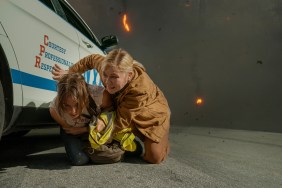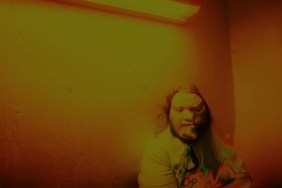
6.5 out of 10
Cast:
John Boyega as Dismukes
Will Poulter as Krauss
Algee Smith as Larry
Jacob Latimore as Fred
Jason Mitchell as Carl
Hannah Murray as Julie
Jack Reynor as Demens
Kaitlyn Dever as Karen
Ben O’Toole as Flynn
John Krasinski as Attorney Auerbach
Anthony Mackie as Greene
Nathan Davis Jr. as Aubrey
Peyton ‘Alex’ Smith as Lee
Malcolm David Kelley as Michael
Joseph David-Jones as Morris
Laz Alonso as Conyers
Ephraim Sykes as Jimmy
Leon Thomas III as Darryl
Gbenga Akinnagbe as Aubrey Pollard Sr.
Chris Chalk as Officer Frank
Directed by Kathryn Bigelow
Detroit Review:
Detroit is troublesome. The events of the 1967 Detroit riots, and specifically, the events at the Algiers Motel which ended in the deaths of three African-American men, is most certainly a history that deserves to be told. More and more, there are past events that must eventually have the light shined upon them, if for nothing else, to document that they really happened, and to fill the corners of our own awareness of history. These are the untold stories of America, and if we are to understand ourselves even remotely, we must take the bitter with the sweet. I am certain that director Kathryn Bigelow and screenwriter Mark Boal had the best intentions in tacking this story, and trying to find real truth amidst all the conflicting testimony and eyewitness accounts of what happened that night. Bigelow seems to be taking an almost journalistic approach to her work of late – while Zero Dark Thirty is probably not as accurate as the filmmakers and the studio would like it to be, it is a real attempt at understanding how everything happened, and Bigelow is searching for truth.
But here’s the problem – truth, in regards to something as racially charged as this, is ephemeral, and when you dramatize these events we can never be sure how much truth is being refracted through the prism of the filmmaker. Perhaps this wasn’t Bigelow’s story to tell. Perhaps she thought that she was bringing attention to difficult subject matter to enlighten us all on how while so much has changed, nothing has. But in her attempts to show the events of July 25-26th, 1967, Bigelow makes a fatal mistake. She paints with wide strokes of dispassion, when there are stories that deserve more attention to detail than others. In the context of the film, the actions of evil men become a larger, more broad tapestry, as if these police officers were unable to stop themselves against the almost tidal forces of hatred and entropy that occurred that night. It is never outright stated, merely hinted upon. But in those abject moments of horror, there are the subtle brushstrokes of justification, as if instead of making better choices, the officers were overwhelmed by it all, and their victims deserve more than that.
I am certain this was not Kathryn Bigelow or Mark Boal’s intentions, but it is there nonetheless. Bigelow is an incredibly gifted filmmaker, able to put the audience right in the middle of things. As the minutes unfold and Officer Krauss (Will Poulter, who can play menacing but with very little nuance for anything else) and his team of Detroit police interrogate and torture these youths, we are never let off the hook. I find it fascinating that Bigelow plays with time almost as much as Christopher Nolan does in Dunkirk; we are given a primer on the Detroit riots and how they began, but then the film slows down to something approximating real time once we get to the Algiers Motel, and then speeds back up again to wrap up the film. Most of the performances are top-notch, especially from Algee Smith, who plays Larry, the lead singer of the Dramatics who is caught at the Algiers Motel at the wrong time, and the events of that night change him forever. Smith deserves awards recognition for his work here. John Boyega also does strong work as a security guard who is legitimately overwhelmed by the events of the night, and suffers for his choices. Detroit is claustrophobic and intense, and we are never given any moments of release. At times, the tension is difficult to take.
I am no stranger to film violence. I understand that Bigelow’s goal here is to put us in the thick of it, to experience a fraction of what these young men and women experienced. And yet, there was a level of uncomfortability here in how Bigelow seems to make everyone complicit in a larger sense. These events didn’t have to happen. Had any of the officers made a different choice that night, it perhaps wouldn’t have happened at all. But by failing to fill in more intimate details, by casting such a wide net over the event, Bigelow does a disservice to the victims. It is as if everyone, in their way, is responsible for what happened at the Algiers Motel, and that is simply not true. In this day and age, we cannot allow anyone to think that could be true. Evil acts were done, and those evildoers never paid for those crimes.
This story deserved more than a Wikipedia-like analysis of what happened. Only during a few moments, such as with Algee Smith’s Larry, does Bigelow get deep and under the surface, and gives us real compassion. In her search for the truth and the larger picture, Bigelow misses the intricate details of these people’s lives that is so essential to telling these kinds of stories correctly. Detroit is a sad, missed opportunity, and while Kathryn Bigelow and Mark Boal meant well, those intentions mean nothing if this story and these victims aren’t given the real treatment that they deserve. Again, perhaps this wasn’t Kathryn Bigelow’s story to tell. And as time moves forward, those opportunities to hear those voices who truly deserve to be heard shrink more and more.
Detroit
-
Detroit

-
Detroit

-
Detroit

-
Detroit

-
Detroit

-
Detroit

-
Detroit










